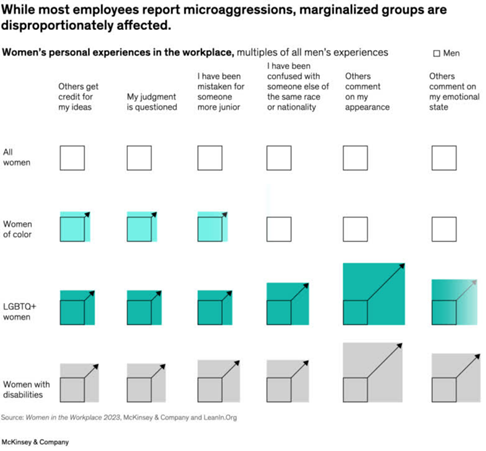
 March is Women's History Month, and this year the National Women's History Alliance (a non-profit dedicated to honoring and preserving women’s history) celebrates “Women Who Advocate for Equity, Diversity, and Inclusion” as the theme for 2024, recognizing women who are advocating for diverse work and social environments free of discriminatory bias and prejudice.
March is Women's History Month, and this year the National Women's History Alliance (a non-profit dedicated to honoring and preserving women’s history) celebrates “Women Who Advocate for Equity, Diversity, and Inclusion” as the theme for 2024, recognizing women who are advocating for diverse work and social environments free of discriminatory bias and prejudice.
In McKinsey & Company’s yearly report on women in the workplace, they compile survey-based evidence on the current working environment of women. Highlighting a shift in work values, the report shows a growing trend where women are actively seeking more fulfilling employment opportunities, a phenomenon often referred to as "voting with your feet".
Furthermore, the report reveals a stark contrast in the investment and recognition of diversity, equity, and inclusion efforts between female and male colleagues. Women are two times as likely as their male coworkers to invest in diversity, equity, and inclusion efforts. Women in the office are expected to make efforts toward a diverse working environment but not always recognized nor rewarded for these efforts. And only a quarter of these women have their efforts recognized by other office leadership in their performance reviews.
This, along with other factors, is causing an increase in worker burnout, but not a decrease in motivation and ambition. Women are simply leaving office environments that don’t support them and their career growth. However, the transition towards hybrid and remote work post-pandemic offers a potential solution. Remote work arrangements not only afford relief from traditional office dynamics but also provide opportunities to reduce the impact of microaggressions.
Microaggressions are subtle, often unintentional actions or comments that convey derogatory messages toward individuals based on their membership in a marginalized group. Despite their seemingly harmless nature, microaggressions have a profound impact on the office environment, contributing to feelings of exclusion, stress, and diminished morale among marginalized individuals. These experiences can damage trust, teamwork, and career advancement. Importantly, microaggression disproportionately affects marginalized people, making existing inequalities worse and continuing systemic discrimination within organizations.

 In McKinsey & Company’s "Women in the Workplace 2023" article, the graph depicting the prevalence of microaggressions sheds light on the significant impact these subtle biases have on women in the workplace. The graph illustrates how these microaggressions are pervasive across different organizational levels and departments, illustrating no part of the workforce is immune to their effects. It also highlights the intersectional nature of these experiences, showing how factors like race, ethnicity, sexual orientation, or disability intersect with gender to compound the effects of microaggressions for women belonging to marginalized groups.
In McKinsey & Company’s "Women in the Workplace 2023" article, the graph depicting the prevalence of microaggressions sheds light on the significant impact these subtle biases have on women in the workplace. The graph illustrates how these microaggressions are pervasive across different organizational levels and departments, illustrating no part of the workforce is immune to their effects. It also highlights the intersectional nature of these experiences, showing how factors like race, ethnicity, sexual orientation, or disability intersect with gender to compound the effects of microaggressions for women belonging to marginalized groups.
In response to the shifting landscape of remote work and the heightened focus on diversity and inclusion, women have been at the forefront of efforts to create more inclusive and equitable working environments. Women's dedication to fostering diverse perspectives, promoting inclusive practices, and advocating for equitable opportunities has been evident, often surpassing the efforts of their male counterparts. Women's leadership in championing these values not only aligns with the theme of this year's Women's History Month, but also exemplifies their ongoing commitment to shaping workplaces that value and respect the contributions of all individuals, regardless of gender or background.
The theme for this year's Women's History Month highlights the importance of creating a society that values and respects diversity, promotes inclusion, and fosters equity. It celebrates the women who have dedicated their lives to promoting these values and who continue to fight for a more just and equitable world.
Dress for Success invites all to join in celebrating this Women's History Month. Together, we can continue to make progress towards a more equitable and inclusive future for all.
If you're interested in joining Dress for Success Cincinnati's efforts to empower women in the community amidst these challenges, there are two impactful ways you can contribute: volunteering your time or making a financial contribution to support our cause.
Volunteering offers various opportunities, from organizing interview attire for our clients to helping out in our donation center.
Additionally, your financial support plays a crucial role in sustaining our organization. Donations allow us to maintain and enhance our programs and services, ensuring we can effectively meet the evolving needs of local women.